六年级英语时态总复习
人教PEP版六年级英语下册总复习时态专项练习题
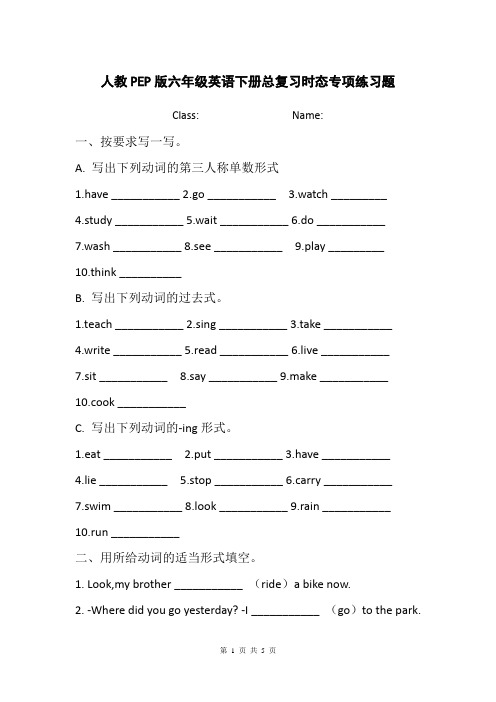
人教PEP版六年级英语下册总复习时态专项练习题Class: Name:一、按要求写一写。
A. 写出下列动词的第三人称单数形式1.have ___________2.go ___________3.watch _________4.study ___________5.wait ___________6.do ___________7.wash ___________ 8.see ___________ 9.play _________10.think __________B. 写出下列动词的过去式。
1.teach ___________2.sing ___________3.take ___________4.write ___________5.read ___________6.live ___________7.sit ___________ 8.say ___________ 9.make ___________10.cook ___________C. 写出下列动词的-ing形式。
1.eat ___________2.put ___________3.have ___________4.lie ___________5.stop ___________6.carry ___________7.swim ___________ 8.look ___________ 9.rain ___________10.run ___________二、用所给动词的适当形式填空。
1. Look,my brother ___________ (ride)a bike now.2. -Where did you go yesterday? -I ___________ (go)to the park.3. May I ___________ (come)in?4. Tom ___________ (visit)his grandparents next week.5. You mustn't ___________ (play)football in the street.6. My grandpa ___________ (tell)us an interesting story just now.7. Can you ___________ (buy)a book for my sister?8. My uncle often ___________ (wear)a black coat.9. I ___________ (clean)my room the day after tomorrow.10. My grandfather ___________ (water)the flowers every day.三、选择填空。
六年级英语知识点归纳时态

六年级英语知识点归纳时态时态是语法中非常重要的一个概念,它用来表达动作或状态发生的时间。
在六年级英语学习中,时态的掌握对于学生的英语表达能力和理解能力有着至关重要的影响。
下面将对六年级英语中常用的时态进行归纳总结,帮助学生更好地理解和运用时态。
一、一般现在时(Simple Present Tense)一般现在时表示经常性、习惯性或普遍性的动作或状态。
在句子中,一般现在时的谓语动词要用原形。
1. 构成:主语 + 动词原形(第三人称单数要加s/es)例如:- He goes to school by bus every day.- They play football after school.2. 用法:- 表示习惯或常规动作:I brush my teeth every night.- 表示客观真理:The sun rises in the east.- 表示定时活动:The train leaves at 9 o'clock.二、一般过去时(Simple Past Tense)一般过去时表示过去某个时间发生的动作或状态。
在句子中,一般过去时的谓语动词需要加上过去式。
1. 构成:主语 + 动词过去式例如:- I watched a movie yesterday.- He played basketball with his friends last week.2. 用法:- 表示过去某个时间发生的动作:She visited her grandparents last Sunday.- 表示过去某段时间的状态:We lived in that house for ten years.三、一般将来时(Simple Future Tense)一般将来时表示将来某个时间将要发生的动作或状态。
在句子中,一般将来时的谓语动词需要使用情态动词“will”。
1. 构成:主语 + will + 动词原形例如:- She will go to the park tomorrow.- We will have a picnic next Sunday.2. 用法:- 表示将来的决定、打算或意愿:I will help you with your homework.- 表示预测或打算:It will rain tomorrow.四、现在进行时(Present Continuous Tense)现在进行时表示正在进行的动作或状态。
六年级英语总复习(时态-语法)
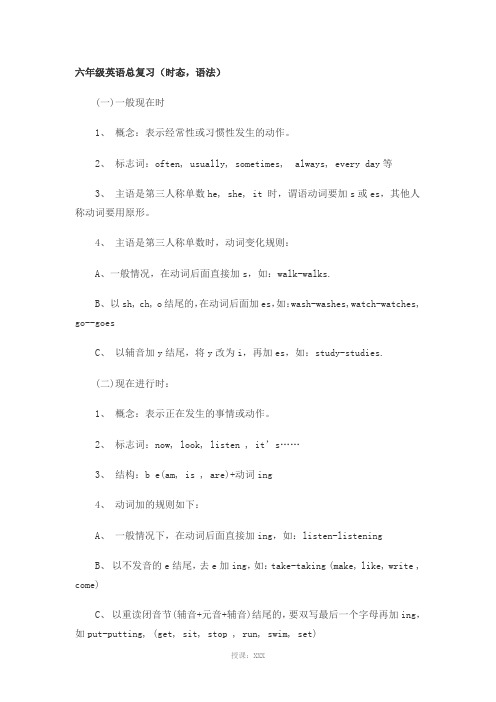
六年级英语总复习(时态,语法)(一)一般现在时1、概念:表示经常性或习惯性发生的动作。
2、标志词:often, usually, sometimes, always, every day等3、主语是第三人称单数he, she, it 时,谓语动词要加s或es,其他人称动词要用原形。
4、主语是第三人称单数时,动词变化规则:A、一般情况,在动词后面直接加s,如:walk-walks.B、以sh, ch, o结尾的,在动词后面加es,如:wash-washes,watch-watches, go--goesC、以辅音加y结尾,将y改为i,再加es,如:study-studies.(二)现在进行时:1、概念:表示正在发生的事情或动作。
2、标志词:now, look, listen , it’s……3、结构:b e(am, is , are)+动词ing4、动词加的规则如下:A、一般情况下,在动词后面直接加ing,如:listen-listeningB、以不发音的e结尾,去e加ing,如:take-taking (make, like, write , come)C、以重读闭音节(辅音+元音+辅音)结尾的,要双写最后一个字母再加ing,如put-putting, (get, sit, stop , run, swim, set)但:see-seeing, eat –eating.(三)一般将来时:1、概念:表示将要发生的事或打算,计划要做的事。
2、标志词:this weekend, next Monday, tomorrow, in seven years’ time3、结构:be(am, is , are) going to +动词原形或者 Will+动词原形如:I am going to take a trip next week.4、否定句:be+not going to +动词原形或者 Will+not(等于won’t)+动词原形(四)一般过去时:1、概念:表示在过去的时间里所发生的事或动作。
译林六年级总复习四种时态复习讲解

总复习时态复习一、一般现在时时间状语:often, usually, sometimes, always, every week (day/month), on Sundays,never1.肯定句:主语(I, you, we, they,复数)+动词原形主语(第三人称单数he, she, Tom…)+动词(变化)★动词+s的变化规则1.一般情况下,直接加-s,如:cook-cooks,2.以s. x. sh. ch. o结尾,加-es,如:guess-guesses, wash-washes, watch-watches, go-goes3. 以“辅音字母+y”结尾,变y为i, 再加-es,如:study-studies4. 不规则变化:have-has2.否定句:主语(I, you, we, they,复数)+don’t+动词原形主语(第三人称单数he, she, Tom…)+does n’t+动词原形3.一般疑问句:Do+主语(I, you, we, they,复数)+动词原形Does+主语(第三人称单数he, she, Tom…)+动词原形4.特殊疑问句:疑问词+ do +主语(I, you, we, they,复数)+动词原形+…?疑问词+ does +主语(第三人称单数he, she, Tom…)+动词原形+…?二、现在进行时:时间状语:now, look…, listen… ,It’s …o’clock.1.肯定句:主语+be+现在分词(v-ing)【be: am , is ,are】2.否定句:主语+be +not+现在分词(v-ing)3.一般疑问句:Be+主语+现在分词(v-ing)★动词加ing的变化规则1.一般情况下,直接加ing,如:cook-cooking2.以不发音的e结尾,去e加ing,如:make-making,3.如果末尾是一个元音字母和一个辅音字母,双写末尾的辅音字母,再加ing,如:run-running, stop-stopping三、过去时:时间状语:yesterday(evening…), just now, a moment ago,last week(year, month, Sunday),last+节日three days ago, ten years ago1.be动词在一般过去时中的变化:肯定句:主语+was/were否定句:主语+was/were +not一般疑问句:Was/Were +主语⑴am 和is在一般过去时中变为was。
六年级英语时态专题复习教案
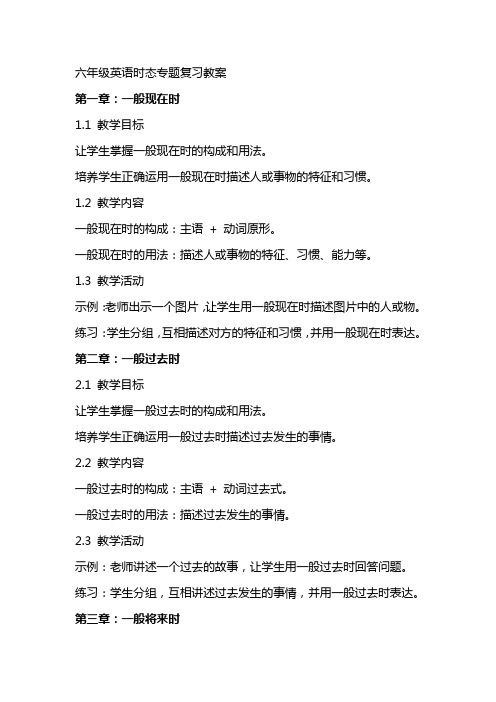
六年级英语时态专题复习教案第一章:一般现在时1.1 教学目标让学生掌握一般现在时的构成和用法。
培养学生正确运用一般现在时描述人或事物的特征和习惯。
1.2 教学内容一般现在时的构成:主语+ 动词原形。
一般现在时的用法:描述人或事物的特征、习惯、能力等。
1.3 教学活动示例:老师出示一个图片,让学生用一般现在时描述图片中的人或物。
练习:学生分组,互相描述对方的特征和习惯,并用一般现在时表达。
第二章:一般过去时2.1 教学目标让学生掌握一般过去时的构成和用法。
培养学生正确运用一般过去时描述过去发生的事情。
2.2 教学内容一般过去时的构成:主语+ 动词过去式。
一般过去时的用法:描述过去发生的事情。
2.3 教学活动示例:老师讲述一个过去的故事,让学生用一般过去时回答问题。
练习:学生分组,互相讲述过去发生的事情,并用一般过去时表达。
第三章:一般将来时3.1 教学目标让学生掌握一般将来时的构成和用法。
培养学生正确运用一般将来时描述将来的计划或预测。
3.2 教学内容一般将来时的构成:主语+ will + 动词原形或主语+ be going to + 动词原形。
一般将来时的用法:描述将来的计划、意图、预测等。
3.3 教学活动示例:老师出示一个图片,让学生用一般将来时描述图片中的人或物将来的动作。
练习:学生分组,互相讨论将来的计划或预测,并用一般将来时表达。
第四章:现在进行时4.1 教学目标让学生掌握现在进行时的构成和用法。
培养学生正确运用现在进行时描述正在进行的动作或状态。
4.2 教学内容现在进行时的构成:主语+ be + 动词ing。
现在进行时的用法:描述正在进行的动作或状态。
4.3 教学活动示例:老师出示一个图片,让学生用现在进行时描述图片中的人或物正在进行的动作。
练习:学生分组,互相描述正在进行的动作或状态,并用现在进行时表达。
第五章:过去进行时5.1 教学目标让学生掌握过去进行时的构成和用法。
培养学生正确运用过去进行时描述过去正在进行的动作或状态。
六年级时态总复习
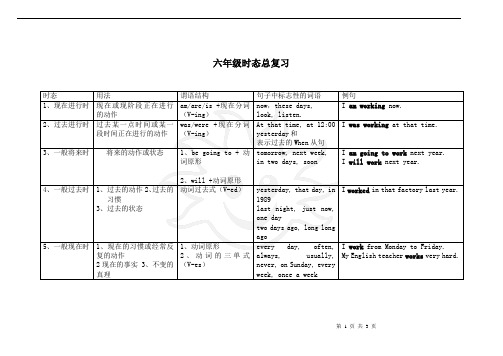
六年级时态总复习时态用法谓语结构句子中标志性的词语例句1、现在进行时现在或现阶段正在进行的动作am/are/is +现在分词(V-ing)now,these days,look, listen.I am working now.2、过去进行时过去某一点时间或某一段时间正在进行的动作was/were +现在分词(V-ing)At that time, at 12:00yesterday和表示过去的When从句I was working at that time.3、一般将来时将来的动作或状态1、be going to + 动词原形2、will +动词原形tomorrow, next week,in two days, soonI am going to work next year.I will work next year.4、一般过去时1、过去的动作2、过去的习惯3、过去的状态动词过去式(V-ed)yesterday, that day, in1989last night, just now,one daytwo days ago, long longagoI worked in that factory last year.5、一般现在时1、现在的习惯或经常反复的动作2现在的事实 3、不变的真理1、动词原形2、动词的三单式(V-es)every day, often,always, usually,never, on Sunday, everyweek, once a weekI work from Monday to Friday.My English teacher works very hard.一般过去时与过去进行时的区别侧重点不同结构不同时间状语不同 例句 一般过去时强调动作已经完成。
1. be 动词的过去式2. 行为动词的过去式3. 情态动词的过去式+动词原形笼统的时间: yesterday, in 1989, last night, just now, two days ago, 1. I was ten last year.2. Tim helped his mother this morning.3. John could ride a bike last year.过去进行时强调在过去的某个时间里动作正在进行。
完整版)六年级英语语法知识点汇总
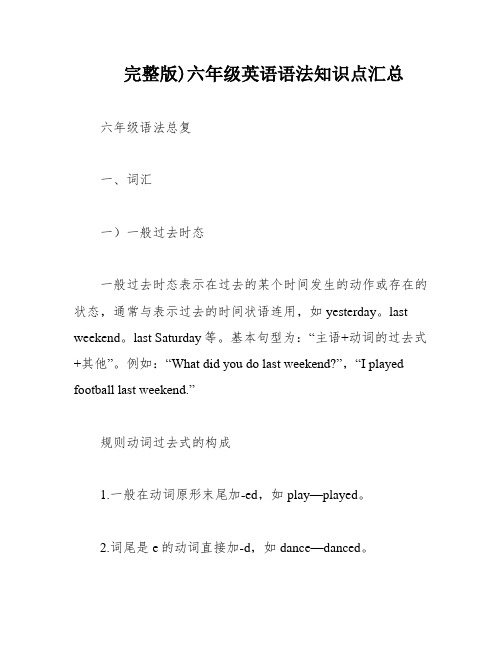
完整版)六年级英语语法知识点汇总六年级语法总复一、词汇一)一般过去时态一般过去时态表示在过去的某个时间发生的动作或存在的状态,通常与表示过去的时间状语连用,如yesterday。
last weekend。
last Saturday等。
基本句型为:“主语+动词的过去式+其他”。
例如:“What did you do last weekend?”,“I played football last weekend.”规则动词过去式的构成1.一般在动词原形末尾加-ed,如play—played。
2.词尾是e的动词直接加-d,如dance—danced。
3.末尾只有一个辅音字母的重读闭音节词,先双写这个辅音字母,再加-ed,(停止)ped。
4.结尾是“辅音字母+y”的动词,变“y”为“i”,再加-ed,如study--studied。
一些不规则变化的动词过去式am/is—was,are—were,see—saw,take—took,read—read,sleep(睡觉)—slept,go—went,come—came,swim—swam,fly—flew,e—became,do—did,get—got,have—had,draw—drew,say—said,hurt—hurt,win—won,tell—told,will—would,eat—ate,cut(切)--cut,sit(坐)—sat,think—thought,find—found,make—made,drink—drank,run(跑)—ran,wear—wore,begin(开始)—began,buy—bought,give(给)—gave,sing—sang。
二)一般现在时态一般现在时态表示包括现在时间在内的一段时间内经常发生的动作或存在的状态,表示惯性或客观存在的事实和真理,通常与often。
always。
usually。
sometimes。
(完整版)小学六年级英语四种时态复习
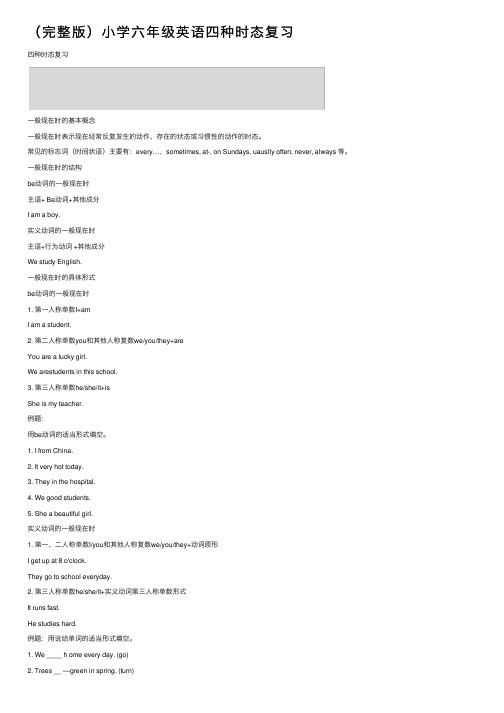
(完整版)⼩学六年级英语四种时态复习四种时态复习⼀般现在时的基本概念⼀般现在时表⽰现在经常反复发⽣的动作、存在的状态或习惯性的动作的时态。
常见的标志词(时间状语)主要有:every…,sometimes, at-, on Sundays, uauslly often, never, always 等。
⼀般现在时的结构be动词的⼀般现在时主语+ Be动词+其他成分I am a boy.实义动词的⼀般现在时主语+⾏为动词 +其他成分We study English.⼀般现在时的具体形式be动词的⼀般现在时1. 第⼀⼈称单数I+amI am a student.2. 第⼆⼈称单数you和其他⼈称复数we/you/they+areYou are a lucky girl.We arestudents in this school.3. 第三⼈称单数he/she/it+isShe is my teacher.例题:⽤be动词的适当形式填空。
1. I from China.2. It very hot today.3. They in the hospital.4. We good students.5. She a beautiful girl.实义动词的⼀般现在时1. 第⼀、⼆⼈称单数I/you和其他⼈称复数we/you/they+动词原形I get up at 8 o'clock.They go to school everyday.2. 第三⼈称单数he/she/it+实义动词第三⼈称单数形式It runs fast.He studies hard.例题:⽤说给单词的适当形式填空。
1. We ____ h ome every day. (go)2. Trees __ —green in spring. (turn)3. He ____ very hard. (study)4. The boy - ___ up at seven O'clock. (get)5. The earth ____ round the sun. (move)补充:主语为第三⼈称单数形式,谓语动词的变化规则:般现在时的句型变化 be 动词的⼀般现在时否定句主语 + be 动词 + not +其他He is not a worker.特殊疑问句特殊疑问词 + ⼀般疑问句Where is he?例题:写出下列句⼦中所缺的be 动词,并⽤肯定及否定形式回答。
英语所有语法知识点六年级

英语所有语法知识点六年级一、动词时态1. 一般现在时:用于表示经常性或普遍性的动作、情况或状态例句:I play football every Sunday.2. 一般过去时:用于表示过去某个时间发生的动作或状态例句:She watched a movie yesterday.3. 一般将来时:用于表示将来要发生的动作或情况例句:I will visit my grandparents next week.4. 进行时态:用于表示正在进行的动作例句:They are eating lunch now.5. 完成时态:用于表示已经完成的动作或状态例句:He has finished his homework.二、名词1. 可数名词与不可数名词例句:There are three apples on the table. (可数名词) I want some water. (不可数名词)2. 单数名词与复数名词例句:The dog is cute. (单数名词)The dogs are playing in the park. (复数名词)3. 名词所有格例句:Tom's book is on the table.三、形容词与副词1. 形容词用于修饰名词,表示名词的性质、特征或状态例句:She has a beautiful flower.2. 副词用于修饰动词、形容词或副词,表示方式、程度或时间等例句:He runs quickly.四、冠词1. 不定冠词(a/an)用于泛指单数可数名词前例句:I see an apple.2. 定冠词(the)用于特指或泛指某个人或物例句:The cat is on the table.五、代词1. 主格代词用于作主语例句:She is my friend.2. 宾格代词用于作宾语例句:He gave me a present.3. 物主代词表示所属关系例句:This is his book.六、介词1. 介词用于表示位置、时间、原因、方式等例句:He is in the park.2. 一些常见介词:in, on, at, with, for, to 等七、连词1. 并列连词用于连接同等重要的词、短语、句子等例句:I like apples and oranges.2. 从属连词用于引导从句例句:She is happy because she won the game.八、疑问词1. 疑问词用于构成疑问句例句:Where is the book?九、形容词比较级与最高级1. 形容词比较级用于表示两者之间的比较例句:She is taller than her sister.2. 形容词最高级用于表示三者或三者以上的比较例句:She is the tallest girl in the class.十、情态动词1. 情态动词用于表示能力、可能性、许可等例句:I can swim.十一、直接引语与间接引语1. 直接引语直接引述别人的原话例句:He said, "I am happy."2. 间接引语是对别人的话进行转述例句:He said he was happy.以上是六年级英语的所有语法知识点,掌握这些知识将会帮助你更好地理解和运用英语语法。
六年级四大时态知识点归纳总结
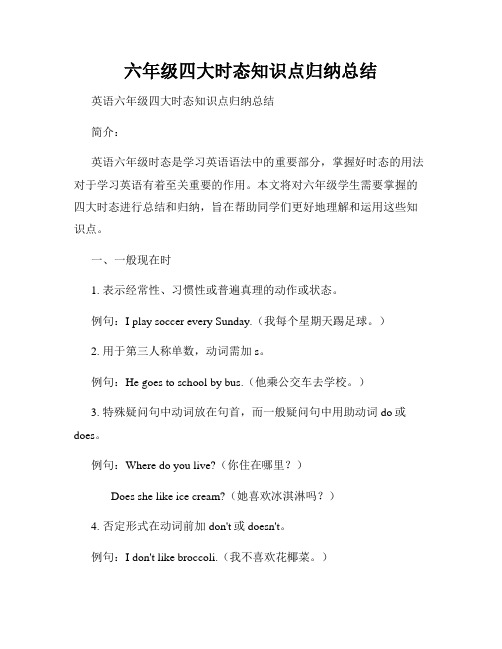
六年级四大时态知识点归纳总结英语六年级四大时态知识点归纳总结简介:英语六年级时态是学习英语语法中的重要部分,掌握好时态的用法对于学习英语有着至关重要的作用。
本文将对六年级学生需要掌握的四大时态进行总结和归纳,旨在帮助同学们更好地理解和运用这些知识点。
一、一般现在时1. 表示经常性、习惯性或普遍真理的动作或状态。
例句:I play soccer every Sunday.(我每个星期天踢足球。
)2. 用于第三人称单数,动词需加s。
例句:He goes to school by bus.(他乘公交车去学校。
)3. 特殊疑问句中动词放在句首,而一般疑问句中用助动词do或does。
例句:Where do you live?(你住在哪里?)Does she like ice cream?(她喜欢冰淇淋吗?)4. 否定形式在动词前加don't或doesn't。
例句:I don't like broccoli.(我不喜欢花椰菜。
)He doesn't play the guitar.(他不弹吉他。
)二、一般过去时1. 表示过去某个时间发生的动作或状态。
例句:I watched a movie yesterday.(我昨天看了一部电影。
)2. 动词过去式一般在动词后加-ed,但也有一些不规则动词。
例句:She ate an apple for breakfast.(她吃了一个苹果作早餐。
)3. 特殊疑问句和一般疑问句中用助动词did。
例句:What did you do yesterday?(昨天你做了什么?)Did they go to the park?(他们去公园了吗?)4. 否定形式在动词前加didn't。
例句:I didn't swim in the lake.(我没有在湖中游泳。
)They didn't finish their homework.(他们没有完成作业。
小学六年级复习时态汇总
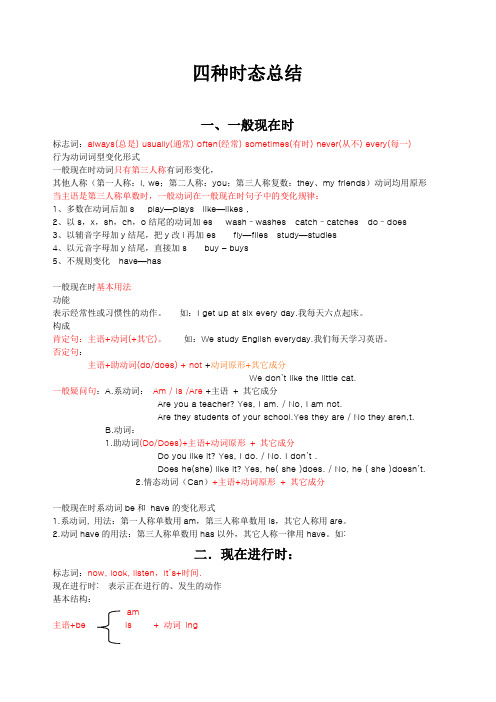
四种时态总结一、一般现在时标志词:always(总是) usually(通常) often(经常) sometimes(有时) never(从不) every(每一)行为动词词型变化形式一般现在时动词只有第三人称有词形变化,其他人称(第一人称:I, we;第二人称:you;第三人称复数:they、my friends)动词均用原形当主语是第三人称单数时,一般动词在一般现在时句子中的变化规律:1、多数在动词后加s play—plays like—likes ,2、以s,x,sh,ch,o结尾的动词加es wash–washes catch–catches do–does3、以辅音字母加y结尾,把y改i再加es fly—flies study—studies4、以元音字母加y结尾,直接加s buy – buys5、不规则变化have—has一般现在时基本用法功能表示经常性或习惯性的动作。
如:I get up at six every day.我每天六点起床。
构成肯定句:主语+动词(+其它)。
如:We study English everyday.我们每天学习英语。
否定句:主语+助动词(do/does) + not +动词原形+其它成分We don’t like the little cat.一般疑问句:A.系动词:Am / Is /Are +主语+ 其它成分Are you a teacher? Yes, I am. / No, I am not.Are they students of your school.Yes they are / No they aren,t.B.动词:1.助动词(Do/Does)+主语+动词原形+ 其它成分Do you like it? Yes, I do. / No. I don’t .Does he(she) like it? Yes, he( she )does. / No, he ( she )doesn’t.2.情态动词(Can)+主语+动词原形+ 其它成分一般现在时系动词be和have的变化形式1.系动词, 用法:第一人称单数用am,第三人称单数用is,其它人称用are。
(完整版)小学六年级人教版英语总复习及知识点
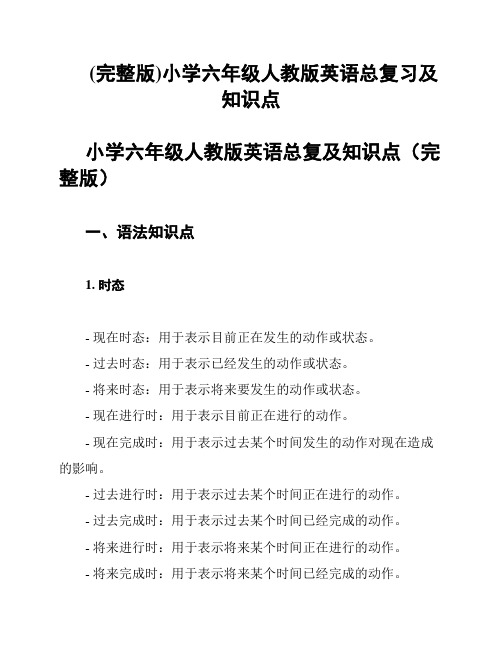
(完整版)小学六年级人教版英语总复习及知识点小学六年级人教版英语总复及知识点(完整版)一、语法知识点1. 时态- 现在时态:用于表示目前正在发生的动作或状态。
- 过去时态:用于表示已经发生的动作或状态。
- 将来时态:用于表示将来要发生的动作或状态。
- 现在进行时:用于表示目前正在进行的动作。
- 现在完成时:用于表示过去某个时间发生的动作对现在造成的影响。
- 过去进行时:用于表示过去某个时间正在进行的动作。
- 过去完成时:用于表示过去某个时间已经完成的动作。
- 将来进行时:用于表示将来某个时间正在进行的动作。
- 将来完成时:用于表示将来某个时间已经完成的动作。
2. 语法结构- 名词:用于表示人、动物、物体、地点等。
- 动词:用于表示动作或状态。
- 形容词:用于描述名词的特征或状态。
- 副词:用于修饰动词、形容词或其他副词。
- 介词:用于表示位置、时间或关系等。
- 代词:用于替代名词。
- 数词:用于表示数量。
- 冠词:用于限定名词的范围。
- 连词:用于连接词语、短语或句子。
3. 句子结构- 主语:句子中执行动作或承受动作的人或事物。
- 谓语:句子中说明主语动作或状态的部分。
- 宾语:句子中接受动作的人或事物。
- 定语:用于修饰名词或代词的成分。
- 状语:用于修饰动词、形容词、副词或整个句子的成分。
- 表语:用于说明主语的状态或特征的部分。
二、总复内容1. 单词- 请根据教材中的单词表,复并牢记相关的单词拼写和意思。
2. 句子- 复教材中的对话和句子,理解并掌握其基本意思和用法。
3. 对话- 复教材中的对话,掌握其中的日常生活用语和表达方式。
4. 语法- 复教材中的语法知识点,加深对时态、语法结构和句子成分的理解。
三、研究方法1. 多听多说- 多听英语教材、歌曲或英语广播,提高听力水平。
- 多说英语,练口语表达和语音准确性。
2. 多读多写- 多读英语教材、故事书等,提高阅读理解能力。
- 多写英语作文,锻炼自己的写作能力和语法运用。
六年级英语时态专项复习
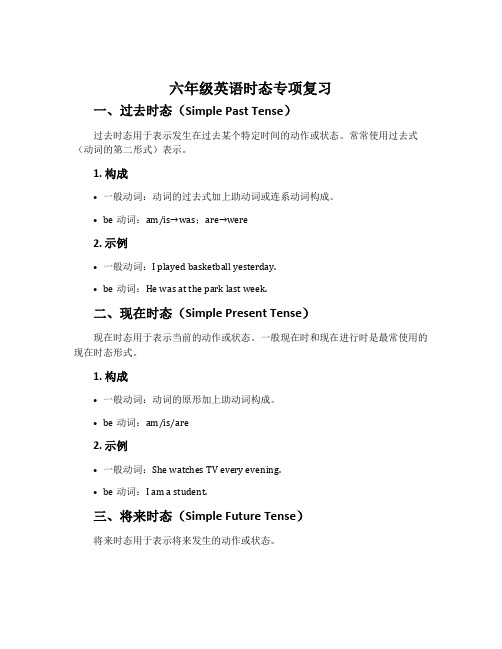
六年级英语时态专项复习一、过去时态(Simple Past Tense)过去时态用于表示发生在过去某个特定时间的动作或状态。
常常使用过去式(动词的第二形式)表示。
1. 构成•一般动词:动词的过去式加上助动词或连系动词构成。
•be动词:am/is→was;are→were2. 示例•一般动词:I played basketball yesterday.•be动词:He was at the park last week.二、现在时态(Simple Present Tense)现在时态用于表示当前的动作或状态。
一般现在时和现在进行时是最常使用的现在时态形式。
1. 构成•一般动词:动词的原形加上助动词构成。
•be动词:am/is/are2. 示例•一般动词:She watches TV every evening.•be动词:I am a student.三、将来时态(Simple Future Tense)将来时态用于表示将来发生的动作或状态。
•一般动词:will + 动词的原形构成。
•be动词:will be2. 示例•一般动词:I will visit my grandparents next week.•be动词:They will be at the party tomorrow.四、现在进行时(Present Continuous Tense)现在进行时用于表示现在正在进行的动作。
1. 构成•一般动词:am/is/are + 动词的现在分词构成。
2. 示例•一般动词:He is eating dinner right now.•be动词:They are playing football in the park.五、过去进行时(Past Continuous Tense)过去进行时用于表示过去某个时间正在进行的动作。
1. 构成•一般动词:was/were + 动词的现在分词构成。
2. 示例•一般动词:She was studying at the library last night.•be动词:They were sleeping when I called.六、现在完成时(Present Perfect Tense)现在完成时用于表示过去某个时间开始,一直延续到现在的动作或状态。
六年级英语时态综合复习ppt课件

tomorrow / next day / this afternoon / next week(month year)
一般过去时
yesterday/last week(year month)
8
一般将来时 一般现在时 一般过去时 现在进行时
A always ,usually,often,sometimes, on the weekends,every day
现在进行时( A ) A、动词-ing形式 一般将来时( D ) B、动词过去式 一般过去时( B ) C、动词-s/-es形式 一般现在时(C D ) D、动词原形
5
购物 go shopping
动词过去式 动词-s/-es形式 动词-ing形式 动词原形
went shopping goes shopping
B yesterday,last week,last year
C Look! Listen! now
D tomorrow ,next day, this afternoon,next yis beautiful .we are
going to Hong Zhou__B_ A、last summer holiday B、next summer holiday 2、He climbs mountains_A____ A、every week B、this weekend 3、I am reading a book_A__ A、now B、this evening
at school. 4、They_a_re__g_o_in_g__to__ta_k_e(take)a trip
next week.
12
1、He_i_s_p_la_yi_n_g_____(play)basketball now. 2、They_a_re_g_o_in_g_t_o_p_la_n_t ____(plant) trees next Monday. 3、Hew_a_tc_h_e_s__(watch)TV every evening.His parents_re_a_d_(read) newspapers every day. 4、Our classmates ___c_l_im_b_e_d________(climb) mountains together last weekend.
小学英语时态总复习(课件)度人教版PEP版英语六年级下册
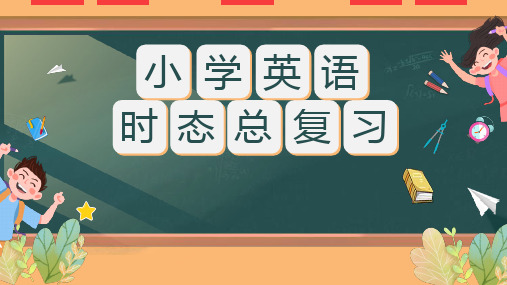
When did you clean the classroom?
yesterday
给对应的时态找到时间伙伴
用动词的正确形式填空 1. she __d_o_e_s_ (do) her homework every evening. 2. We ___f_l_y__ (fly) kites in the park on Sundays. 3. My mother __c_le_a_n_e_d_ (clean) our room last Sunday. 4. Tom __p__la_y_s_(play) the piano every Saturday. Now he_i_s_p_la_y_ing(play). 5. She __l_ik_e_s__(like) swimming. She i_s g_o_in_g_to__sw_im_(swim) next weekend. 6. Usually my mother _w_a_s_h_e_s_ (wash) the dishes after lunch. But my grandma_w_a_s_h_e_d_ (wash) yesterday. 7. Look at the man! He __is_r_e_a_d_i_n_g__ (read) a magazine. 8. _D__id_ (do)you__d_o(do)homework last weekend?
习惯性的 动作
爱好
Tip
经常发生
现在进行时态 表示正在发生的动作, 常与表示现在的时间 now, listen, look 连用
结构:
问:What+be动词+主语+doing? 答:主语+be动词+动词ing形式。 如:——What are you doing?
六年级英语知识点时态总结
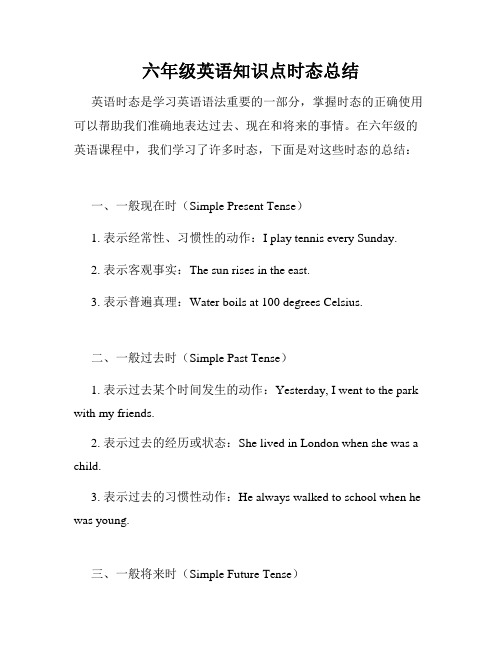
六年级英语知识点时态总结英语时态是学习英语语法重要的一部分,掌握时态的正确使用可以帮助我们准确地表达过去、现在和将来的事情。
在六年级的英语课程中,我们学习了许多时态,下面是对这些时态的总结:一、一般现在时(Simple Present Tense)1. 表示经常性、习惯性的动作:I play tennis every Sunday.2. 表示客观事实:The sun rises in the east.3. 表示普遍真理:Water boils at 100 degrees Celsius.二、一般过去时(Simple Past Tense)1. 表示过去某个时间发生的动作:Yesterday, I went to the park with my friends.2. 表示过去的经历或状态:She lived in London when she was a child.3. 表示过去的习惯性动作:He always walked to school when he was young.三、一般将来时(Simple Future Tense)1. 表示将来的计划或安排:We will have a picnic next weekend.2. 表示将来的意图或打算:I will study harder for the exams.3. 表示预测或推测的未来:It will rain tomorrow.四、现在进行时(Present Continuous Tense)1. 表示现在正在进行的动作:I am reading a book right now.2. 表示现阶段的临时状况:She is staying at her friend's house this week.五、过去进行时(Past Continuous Tense)1. 表示过去某个时间正在进行的动作:I was watching TV when she called me.2. 表示过去的过程或状态:They were having dinner at that time.六、将来进行时(Future Continuous Tense)1. 表示将来某个时间正在进行的动作:They will be studying at this time tomorrow.2. 表示将来某个时刻的临时状况:He will be working late tonight.七、现在完成时(Present Perfect Tense)1. 表示过去发生的动作对现在的影响:I have finished my homework, so I can go out and play.2. 表示过去某个时间内发生的动作:He has visited China three times.八、过去完成时(Past Perfect Tense)1. 表示过去某个时间之前完成的动作:She had already left when I arrived.2. 表示过去某个时间之前持续的状态:They had been friends for many years before they had a fight.九、将来完成时(Future Perfect Tense)1. 表示将来某个时间之前将会完成的动作:By this time next year, I will have graduated from university.2. 表示将来某个时间之前一直持续的状态:He will have been working for 10 years by the end of next month.以上是六年级英语知识点时态的总结。
六年级英语总复习(时态,语法)

六年级英语总复习(时态,语法)(一)一般现在时1、概念:表示经常性或习惯性发生的动作。
2、标志词:often,usually,sometimes,always,everyday 等3、主语是第三人称单数he,she,it 时,谓语动词要加s或es,其他人称动词要用原形。
4、主语是第三人称单数时,动词变化规则:A、一般情况,在动词后面直接加s,如:walk-walks.B、以sh,ch,o结尾的,在动词后面加es,如:wash-washes,watch-watches,go--goesC、以辅音加y结尾,将y改为i,再加es,如:study-studies.(二)现在进行时:1、概念:表示正在发生的事情或动作。
2、标志词:now,look,listen,it3、结构:be(am,is,are)+ 动词4、动词加的规则如下:A、一般情况下,在动词后面直接加’s⋯⋯inging,如:listen-listeningB、以不发音的e结尾,去e加ing,如:take-taking (make,like, write , come)C、以重读闭音节(辅音+元音+辅音)结尾的,要双写最后一个字母再加ing,如put-putting,(get,sit,stop,run,swim,set)但:see-seeing,eat –eating.(三)一般将来时:1、概念:表示将要发生的事或打算,计划要做的事。
2、标志词:this weekend,nextMonday,tomorrow,insevenyears’time3、结构:be(am,is,are)goingto+ 动词原形或者Will+动词原形如:Iamgoingtotakeatripnextweek.4、否定句:be+notgoingto+ 动词原形或者Will+not( 等于won’t)+ 动词原形(四)一般过去时:1、概念:表示在过去的时间里所发生的事或动作。
- 1、下载文档前请自行甄别文档内容的完整性,平台不提供额外的编辑、内容补充、找答案等附加服务。
- 2、"仅部分预览"的文档,不可在线预览部分如存在完整性等问题,可反馈申请退款(可完整预览的文档不适用该条件!)。
- 3、如文档侵犯您的权益,请联系客服反馈,我们会尽快为您处理(人工客服工作时间:9:00-18:30)。
六年级英语时态总复习
一、现在进行时:表示现在正在进行的动作。
句子结构:主语+be动词+现在分词。
问句结构:疑问词+be动词+主语+现在分词。
否定句:在am,is ,are 后面加上not,is not=isn’t, are not=aren’t
一般疑问句Be动词放在句首:如Are they playing football now?Yes,they are./No, they aren’t.
时间词:now现在,Look看,看到这样的词,常用现在进行时。
如:Look,Danny is playing ping-pong.看,丹尼正在打乒乓球。
1.What are they doing now?他们现在正在做什么?They are playing football now.他们现在正在踢足球。
2.What is Li Ming doing ?李明正在做什么?Li Ming is playing basketball .李明正在打篮球。
3.What are you doing ?你正在做什么?I am doing exercise.我正在做锻炼。
4.Who is taking a picture?谁正在拍照?My brother is taking a picture.我的哥哥正在拍照。
注意:主语是You,They,复数时,be动词用are。
主语是单数,be动词用is。
主语是I,be动词用am。
二、一般将来时:表示未来要发生的动作。
句子结构:主语+be going to 或者will +动词原形。
问句结构:疑问词+be +主语+ going to+动词原形,或者疑问词+will+主语+动词原形。
常用的时间词:tomorrow明天,next week下周,next Saturday下周六,the day after tomorrow后天,
否定句:am,is,are 后面加not,或者will后面加not,will not=won’t.
一般疑问句:Be动词放在句首,或者Will放在句首。
例如:Is he going to play sports next Sunday?Yes,he is./No,he isn’t.下周日,他打算去运动吗?是的。
/不是。
Will Jenny clean her bedroom next Saturday?Yes,she will./No,she won’t.
1. What are you going to do tomorrow?明天你将要做什么?I am going to fly a kite tomorrow.明天我将要去放风筝。
2.What is he going to do next Sunday?下周日他将要做什么?He is going to play sports next Sunday.他将要去做运动。
3. What are they going to do next week?下周他们将要做什么They are going to buy some clothes next week.他们将要去买衣服。
4.How will Jenny go to the sea next Saturday?詹妮下周六将怎么去海边?She will go to the sea by plane.她将要乘飞机去。
5.Where will you go tomorrow?I will go to Beijing tomorrow.明天我将要玩电脑游戏。
6.When will they go on a trip to the sea?他们将什么时候去海边旅行?They will go next Sunday.他们将下周去。
7.Who will you travel with?你将要和谁一起旅游。
I will travel with my family.我将要和我的家人旅游。
8.What will you do tomorrow?明天你将要做什么?I will visit my uncle and aunt.我将要看望我的叔叔婶婶。
三、一般过去时:表示过去的时间发生的动作。
句子结构:主语+动词过去式。
问句结构:疑问词+did+主语+动词原形。
常用时间词:yesterday 昨天,last night昨天晚上,last Sunday上周日,last year去年,the day before yesterday前天,this morning今天早晨
this afternoon今天下午(有时也用于一般将来时,看语境。
)
否定句:主语+didn’t+动词原形,如:Li Ming didn’t play basketball this morning.
一般疑问句:Did+ 主语+动词原形,如:Did you have fun?Yes,I did./No, I didn’t.
1.When did you do have a party?你什么时候开的派对?I had a party at 4:00 yesterday afternoon.我昨天下午四点开的派对。
2.What did they do yesterday?昨天他们做什么了?They taught each other a sport yesterday.昨天他们互相教了一项运动。
3.How did you go to the park yesterday?昨天你怎么去的公园?I went to the park by car./On foot./By bus.我乘小轿车去的公园。
/步行。
/乘公共汽车。
4.What did Li Ming do this afternoon?Li Ming played basketball this aftennoon.李明今天下午打篮球了。
5.Where did you go this morning?今天早晨你去哪里了?I went to the supermarket.我去超市了。
四、一般现在时。
表示经常反复习惯发生的动作。
常用的频度副词:often 经常,usually通常,always总是,一直,sometimes有时,never从不
否定句:主语+don’t + 动词原形,如I don’t often play basketball.单三主语+doesn’t+动词原形,如:Jenny doesn’t throw the ball.
一般疑问句:Do +主语+动词原形?如:Do they often play
basketball?Yes,they do./No,they don’t.
Does +单三主语+动词原形?如:Does he always have breakfast?Yes,he does./No,he doesn’t.
1.What do Jenny and Li Ming do?Jenny and Li Ming often buy things at the shop.詹妮和李明经常在商店里买东西。
(注意:主语是Jenny and Li Ming 两个人,是复数,动词buy用原形。
)
2.Danny always thinks he can catch the ball,but he can’t.丹尼一直认为他能接住球,但是他不能。
(注意:主语Danny是单数的第三人称,动词think要用单三形式即加s。
动词单三形式和名词变复数规律一样。
)
3.What does Jenny sometimes do?Jenny sometimes teaches Li Ming to skate.詹妮有时教李明滑冰。
(注意:Jenny是单数第三人称,动词teach 变单三形式加es)
4.What do you do every day?I have breakfast every day.我每天都吃早餐。
5.He is a good basketball player.他是一个好篮球运动员。
6.How do you go to school?I go to school by bike./By bus.你怎样去上学?我骑自行车去上学。
/乘公共汽车。
7.How does Li Ming go to the zoo?李明怎么样去动物园?He goes to the zoo by car.他乘小轿车去动物园。
8.Where does he go?他去哪儿?He goes to the shop.他去商店。
以上四大时态要熟练运用,能根据主语写不同时态的句子,能根据答句写出问句,根据问句写出答句。
常用疑问词:What什么,What colour什么颜色,Where哪儿,How怎么样,How much多少钱,多少,How many多少,How old多大年龄,How far多远,How long多长,Who谁,whose谁的,Which哪一个,When什么时候,What time几点。
